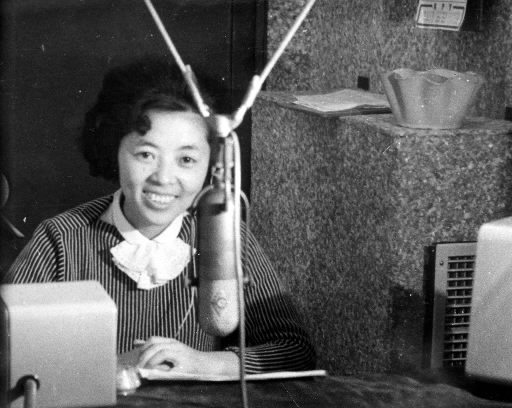My Life: Interview with TV Director Yasuko Isono, Part 7
Jun. 26, 2013
Announcer
by Takahiro Yamase, Staff Writer
Growing interest in on-site reporting
In 1959, three TV announcers, one man and two women, including me, were hired at the company. The other two announcers had lived in Tokyo and spoke standard Japanese well, but I had a difficult time adjusting my strong Hiroshima dialect.
Our team of announcers first took part in a long-term training on reading the news held in Tokyo by the National Association of Commercial Broadcasters in Japan (NAB).
The trainers were announcers who worked at major TV stations. Kotoko Kurusu, the announcer for a 15-minute broadcast titled “Women’s News,” which aired in the 1950s and 1960s, was one of them.
Ms. Kurusu was the only female trainer. She taught us to be mentally prepared for the broadcasting world and how we should carry out our role when put in charge of a program. I was impressed with her advice, as the male trainers stressed the importance of techniques and seldom mentioned such points.
Ms. Kurusu was a good interviewer and could report the news from a variety of viewpoints. She told us that gender should not play a part in our reporting and that we must pursue our work seriously, without gender being an issue. I felt that I should learn from her, a more experienced woman in this profession.
During the training in Tokyo, I had opportunities to observe the news coverage at the Diet building, art museums, and the baseball stadium. Since I had wanted to pursue producing my own programs, it was a great chance to learn such things as gathering material and putting programs together, which were necessary skills for a director, and yet difficult to learn in local cities.
Back then, commercial stations across Japan had just begun television broadcasting. Radio Yamaguchi (now the Yamaguchi Broadcasting Company, located in the city of Shunan) produced little of its own programming.
Although I was employed as an announcer for TV, as a junior member of the staff, I had no assignments. My first duty involved reading call signs each hour for the radio. That’s when an announcer says, “This is JOPF...”
When there was time to fill, I would read the weather forecast. Soon I began to read short new items. Back then, announcers were told to reveal no emotion when broadcasting. We were trained to have no presence at all, to be like the air. Today, though, it’s important for announcers to show some appeal as individuals.
Of the two female announcers hired that year, my colleague was feminine and had an elegant way of speaking. As I seemed to be more hardy, I did a lot of the on-site reporting, and found this work rewarding. I preferred reporting live from a location, rather than reading from a script in the studio. I wasted no time appealing to the personnel department for a transfer to the production division.
(Originally published on December 8, 2010)
by Takahiro Yamase, Staff Writer
Growing interest in on-site reporting
In 1959, three TV announcers, one man and two women, including me, were hired at the company. The other two announcers had lived in Tokyo and spoke standard Japanese well, but I had a difficult time adjusting my strong Hiroshima dialect.
Our team of announcers first took part in a long-term training on reading the news held in Tokyo by the National Association of Commercial Broadcasters in Japan (NAB).
The trainers were announcers who worked at major TV stations. Kotoko Kurusu, the announcer for a 15-minute broadcast titled “Women’s News,” which aired in the 1950s and 1960s, was one of them.
Ms. Kurusu was the only female trainer. She taught us to be mentally prepared for the broadcasting world and how we should carry out our role when put in charge of a program. I was impressed with her advice, as the male trainers stressed the importance of techniques and seldom mentioned such points.
Ms. Kurusu was a good interviewer and could report the news from a variety of viewpoints. She told us that gender should not play a part in our reporting and that we must pursue our work seriously, without gender being an issue. I felt that I should learn from her, a more experienced woman in this profession.
During the training in Tokyo, I had opportunities to observe the news coverage at the Diet building, art museums, and the baseball stadium. Since I had wanted to pursue producing my own programs, it was a great chance to learn such things as gathering material and putting programs together, which were necessary skills for a director, and yet difficult to learn in local cities.
Back then, commercial stations across Japan had just begun television broadcasting. Radio Yamaguchi (now the Yamaguchi Broadcasting Company, located in the city of Shunan) produced little of its own programming.
Although I was employed as an announcer for TV, as a junior member of the staff, I had no assignments. My first duty involved reading call signs each hour for the radio. That’s when an announcer says, “This is JOPF...”
When there was time to fill, I would read the weather forecast. Soon I began to read short new items. Back then, announcers were told to reveal no emotion when broadcasting. We were trained to have no presence at all, to be like the air. Today, though, it’s important for announcers to show some appeal as individuals.
Of the two female announcers hired that year, my colleague was feminine and had an elegant way of speaking. As I seemed to be more hardy, I did a lot of the on-site reporting, and found this work rewarding. I preferred reporting live from a location, rather than reading from a script in the studio. I wasted no time appealing to the personnel department for a transfer to the production division.
(Originally published on December 8, 2010)








